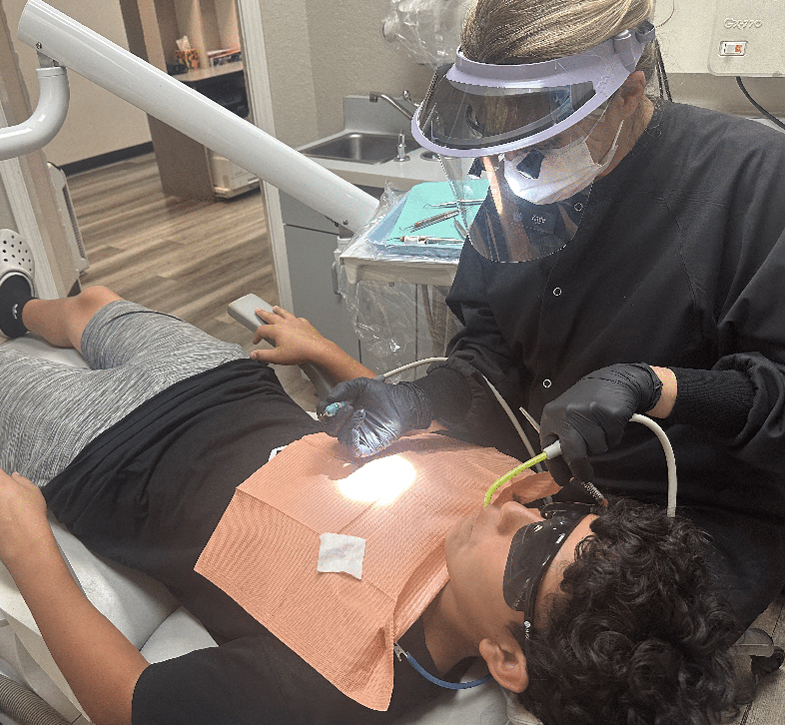
What exactly is periodontal disease?
Gum disease, or periodontal disease, is a multifaceted oral condition with significant implications for oral health. It encompasses various inflammatory conditions affecting the tissues supporting and surrounding teeth, collectively termed the "periodontium."
The primary cause of gum disease is harmful bacteria residing in dental plaque and tartar, which accumulate around and beneath the gumline. These bacteria release toxins, triggering irritation and inflammation of the gums, initiating the early stage known as gingivitis. If left untreated, gingivitis can progress to periodontitis, a more severe form of gum disease causing irreversible damage to gums, bone, and other tooth-supporting structures.
Gum disease often develops silently, without causing noticeable pain or discomfort, making it challenging for individuals to detect until it reaches an advanced stage. Regular dental checkups are vital as dentists can identify early signs and symptoms that might be missed otherwise.
Maintaining excellent oral hygiene is key in preventing and managing gum disease. This involves brushing your teeth at least twice daily, daily flossing, and using antimicrobial mouthwash to reduce oral bacteria. Embracing a healthy lifestyle with a balanced diet and avoiding tobacco use significantly contributes to preventing gum disease.
Recognizing the signs and symptoms of gum disease is crucial for maintaining oral health. These may include red, swollen, or tender gums, bleeding while brushing or flossing, persistent bad breath, receding gums, loose or shifting teeth, and changes in your bite. Seeking professional dental care promptly upon experiencing these symptoms is essential to prevent further damage.
In summary, gum disease is a complex and potentially serious condition requiring attention and care. Practicing good oral hygiene, regular dental visits, and being aware of gum disease symptoms enable proactive steps to maintain oral health and hinder the progression of this inflammatory condition.
Some signs that you may have periodontal disease include:
Some signs that you may have periodontal disease include:
- Inflamed and red gums
- Bleeding when brushing or flossing
- Receding gums and exposed tooth root surfaces
- Sensitivity to hot or cold temperatures
- Bad breath or a bad taste in the mouth
- Loose teeth
- New spaces between the teeth or a change in the bite
- Change in the fit of existing partial dentures
- Discharge around the teeth and gums
- Sharp or dull pain when biting down or chewing food
Why Good Oral Health is Important
Caring for your smile extends beyond teeth and gums—it significantly impacts overall health. Recent studies have linked periodontal disease, a primary cause of adult tooth loss, to various medical conditions like heart disease, stroke, diabetes, and respiratory issues.
At Discover Dental, we recognize the criticality of early prevention, detection, and treatment of periodontal disease. Our focus is on offering patients essential guidance, support, and treatment to ensure optimal periodontal health.
WHAT IS GINGIVITIS?
Gingivitis, the initial phase of gum disease, may not cause discomfort but presents specific signs to watch for. Bleeding, redness, swelling, or tenderness in your gums during brushing could indicate gingivitis.
The positive news is that early treatment of gingivitis can halt further gum damage seen in later disease stages. At this stage, overall gum health remains largely intact despite inflammation.
Treating gingivitis now often suffices to reverse the disease and prevent permanent gum damage. Deep dental cleanings, improved oral hygiene practices at home, and regular maintenance play a vital role in halting the progression of this gum disease stage.
Allow us to assist you in maintaining excellent periodontal health.
At Discover Dental, we offer personalized and advanced solutions to maintain healthy gums and attain a beautiful, functional smile. Our skilled team utilizes state-of-the-art technology and treatment techniques tailored to various periodontal conditions.
Leveraging the latest dental advancements, our periodontal treatments not only halt the progression of gum disease but also include effective procedures such as bone grafting and regenerative treatments. These interventions support tissue repair, restore bone density, enhance aesthetics, and establish proper support for dental implant placement.
